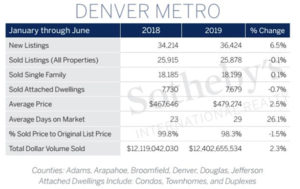List sooner than later and prepare for a wonky second half of 2020
After receiving questions from clients, friends and family asking how the upcoming U.S. Presidential election year will affect the Denver real estate market, I decided to compile an election market preview post.
Presidential election years are stressful to begin with for many Americans, especially given the current passionate political divide, and in times of uncertainty, people are less likely to take chances. This includes making large purchases such as homes. Consumer confidence tanks and the stock market gets a bit wonky.
Election years most often affect on the top 10 percent of the Denver market, which means if you plan to sell your home in 2020 and the value of your home is over $700,000, LIST EARLY (February or March 2020). This way, your listing will have some exposure before election noise takes over and many people get distracted from making big decisions, like moving.
But, if the past two election cycles are anything to go by, buyers may have some incentive to act, as interest rates on 30-year fixed-rate mortgages — the most common mortgages buyers get — remained south of 4 percent before the election, and jumped above just after.

Source: LIV Sotheby’s International Realty
What to do
Sellers: list early in the year to avoid the noise of an election cycle.
Buyers: You’ll have opportunities in the months just before the election, September and October, to see houses with less Buyer competition and potentially nab a lower mortgage interest rate.
The fall market
The election season is coming fast, but, of course, we still have a whole season before it really heats up. So what to expect for the fall 2019?
First of all, the buyer pool pretty much dwindles every month between now and January 2020. We’re in year seven of this real estate cycle, and 2019 has proved so far to be a cooler market than recent years.
September ends with 2.04 months of single-family home inventory and 2.12 months of condos for sale. According to Denver Metro Association of Realtors, housing inventory under five months is considered a seller’s market.
In the Denver area, the real estate season is usually busiest from March through September,” said Jill Schafer, Chair of the DMAR Market Trends Committee and Metro Denver REALTOR®. “This year, you could say we’ve been turning from an extremely fast-paced market to a slower moving, healthier one.”
Given that Denver economy is stellar — unemployment rates between 2.5 and 3 percent — and mortgage interest rates remain low, buyers are ready to buy, if they can find something. With its diversified economy — not heavily reliant on the oil-and-gas industries, for example — economists do not believe Denver is in a bubble.
Sellers: be patient and be prepared to price below recent sales if you need to sell by the end of 2019. Buyers: the fall market is a time to purchase a home for slightly less than what you may pay during the spring selling season.


